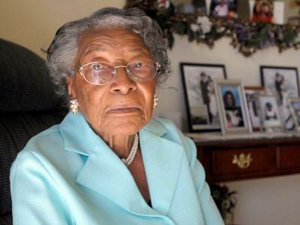Last Wednesday, I reported for Colorlines.com that state Rep. Dexter Grimsley, D-Newville, wants Alabama to issue a formal state apology to Recy Taylor, 91, who was abducted and raped at gunpoint by seven white men in Abbeville on Sept. 3, 1944.
“The circumstances merit it,” Grimsley said recently. “It’s something that should be done. Recy Taylor found herself in a situation that wasn’t responded to, the way that the law would respond to something today.”
Now it appears that an apology from Henry County and the southeast Alabama city of Abbeville may come as soon as Monday, but it is unclear whether the state will take part. In a follow-up interview last Thursday, Rep. Grimsley said he would hold a press conference with Abbeville Mayor Ryan Blalock and County Commission Chairman Joanne Smith and “present a formal letter to the family.”
Asked if the apology would also be on behalf of the state, Grimsley said, “We haven’t addressed that level yet.”

Recy Taylor
in her Florida home (AP Photo/Phelan M. Ebenhack)
Officials scheduled to be there are Alabama State House Representative Dexter Grimsley, Mayor Ryan Blalock and members of the Abbeville City Council.
Whether an apology will be issued to Recy Taylor tomorrow has not been verified. Abbeville Mayor Ryan Blalock and Alabama Representative Dexter Grimsley have asked Recy Taylor’s brother Robert Corbitt to attend the press conference, and he has told me that he plans to be there.
Margaret Burnham stated the importance of an apology.
“Clearly there should be an apology from the state here as well as the county,” said Professor Margaret Burnham, director of the Civil Rights and Restorative Justice Program at Northeastern University School of Law. “Each failed to pursue the investigation aggressively and promptly, and more generally afforded utter impunity to white men who raped black women. Such a statement would not only honor Recy Taylor and her family for their courage and tenacity in seeking justice, but it would speak to scores of victims who similarly suffered in silence.”
Other Questions
Even if Recy Taylor gets her due from Alabama officials, many questions remain about how countless other cases of decades old racially motivated rapes will be addressed. There are some states where the FBI could play a role.The FBI’s role
Though Alabama and five other Southern states have no statute of limitations on rape, only civil rights-era homicides of African Americans — mostly of men — have commanded the official attention of the FBI and other federal and state officials.
The six Southern, formerly segregated states with no statute of limitations on the crime of rape are: Alabama, Florida, Louisiana, Mississippi, North Carolina and South Carolina.
Yet, local police and county sheriffs rarely have the staff or the budgets to conduct such investigations. Further, officials in small communities may lack motivation because they would be investigating their own relatives or the politically powerful.
When it comes to decades-old racially motivated deaths, the FBI can investigate cases even when there is no federal jurisdiction. The Emmett Till Unsolved Civil Rights Crimes Act of 2008 directs the FBI to investigate and do community outreach with the express purpose of supporting or encouraging state and local action.
Asked if the FBI could play a similar role in addressing decades-old racially motivated rapes, FBI spokesman Christopher Allen said, “The public is always welcome to report an allegation of a crime to their local FBI office, where it will be reviewed to determine if a federal violation exists.”
No special consideration would be made. “We would handle [it] as we do every other allegation of a crime: on its own merits,” Allen said.
Testimony of black women
In an e-mail interview, Professor McGuire says her research “covers about 64 cases of white on black rape from 1940 to 1975 and is not exhaustive in any way.
“I found black women’s testimonies of sexual violence everywhere I looked.”
Does Professor Burnham think the Department of Justice ought to address civil-rights era, racially motivated rapes in states like Alabama?
“The Emmett Till Act itself only covers murders,” Burnham said. “But the animating spirit of the act is to encourage law enforcement and courts to redress the racial wrongs that locked black crime victims out of the justice system during the mid-20th century. Certainly, if opportunities for prosecution remain open, the Justice Department should play a role.”

No comments:
Post a Comment